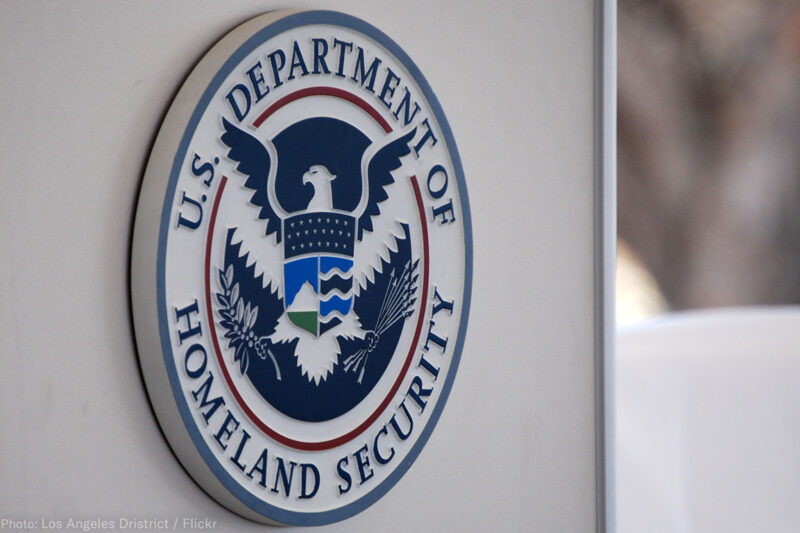
A recent draft report from the Department of Homeland Security called for the discriminatory surveillance of Sunni Muslims in the United States.
The originated in U.S. Customs and Border ProtectionÔÇÖs Office of Intelligence and was obtained and published by Foreign Policy magazine. It ÔÇťexamines 29 perpetrators of 25 terrorist incidents in the United StatesÔÇŁ that CBP ÔÇťassesses were driven by radical Sunni Islamist militancy.ÔÇŁ It concludes, based on the ÔÇťcommon demographicsÔÇŁ of those in the study, that the government should ÔÇťcontinuously evaluateÔÇŁ those with similar characteristics in order to identify ÔÇťindividuals who might have a higher risk of becoming radicalized.ÔÇŁ A CBP spokesperson stated that the report was an initial draft and has since been revised.
The report is nonetheless alarming. First, letÔÇÖs dispense with the euphemisms: When CBP calls for ÔÇťvetting,ÔÇŁ ÔÇťrecurrent screening,ÔÇŁ and ÔÇťon-going evaluations,ÔÇŁ it is talking about long-term surveillance. And that surveillance would be nakedly discriminatory: The report focuses exclusively on Sunni Muslims in the United States and identifies religion and national origin in the ÔÇťMiddle East, South Asia or AfricaÔÇŁ as reasons to ÔÇťcontinuously evaluateÔÇŁ those who meet the profile. It also oozes religious animus, referring without evidence or explanation to ÔÇťthe long-term difficulty for some Muslim immigrants to integrate into U.S. society,ÔÇŁ and casting particular suspicion on ÔÇťMuslim converts.ÔÇŁ
Because this bias is baked into the report, its conclusions are nonsensical from a scientific standpoint. It analyzes only incidents involving what it calls ÔÇťradical Sunni Islamist militancyÔÇŁ ÔÇö ignoring of attacks, like violent right-wing extremism. It then concludes that those with characteristics similar to the 29 perpetrators should be surveilled. And even using this absurdly limited data set, the report still canÔÇÖt identify meaningful trends or commonalities, leaving only what the attackers in the analysis shared: their Sunni Muslim identity. In other words, the report assumes its own conclusion, that Sunni Muslims, by virtue of their religion, should be subject to heightened surveillance. ThatÔÇÖs the empirical equivalent of a dog chasing its own tail.
The premise of the report is also deeply flawed. DHS thinks it can identify people on a ÔÇťpath to radicalizationÔÇŁ by scrutinizing their beliefs, speech, or backgrounds. But have that theory. Despite decades of research, no reliable indicators can be used to predict who will commit a terrorist act. So the thinking underlying this report would lead the government to waste time and money surveilling and scrutinizing vast populations of innocent people because of who they are or where they come from.
The disclosure of this draft DHS report follows closely on the release of another DHS issued with the Department of Justice, which inaccurately claims are responsible for most terrorist attacks, and concludes that immigration must be restricted as a matter of national security. That report overlooked attacks by white supremacist groups, includes data from attacks that occurred overseas, and counts suspects who were extradited to the United States as ÔÇťimmigrantsÔÇŁ for the purpose of its obviously political agenda.
Reports such as these are also serving as grist for ÔÇťextreme vettingÔÇŁ ÔÇö a set of dangerous and discriminatory initiatives propped up by cherry-picked information used to justify them. While details about these extreme vetting measures are still emerging, it is clear that they employ widespread social media and internet surveillance to flag people for deportation, border searches, or visa denials. The White House the consolidation of these programs on Monday with the creation of the ÔÇťNational Vetting Center.ÔÇŁ
The draft DHS report disclosed this week reflects ÔÇťintelligence analysisÔÇŁ at its worst: misinformed, misleading, and infected with bias. It is yet another symptom of the anti-Muslim bigotry coursing through the Trump administration, and it should be recognized for what it is: complete trash.

